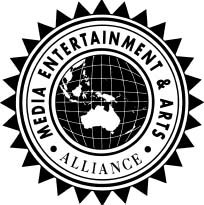Related Research Articles

The Actors' Equity Association (AEA), commonly referred to as Actors' Equity or simply Equity, is an American labor union representing the world of live theatrical performance, as opposed to film and television performance. However, performers appearing on live stage productions without a book or through-storyline may be represented by the American Guild of Variety Artists (AGVA). As of 2010, Equity represented over 49,000 theatre artists and stage managers.

Equity, formerly officially titled the British Actors' Equity Association, is the trade union for theatre directors, fight directors, choreographers, set designers, costume designers, lighting designers, actors, stage managers, models and performers in the United Kingdom. It was formed in 1929 by a group of West End performers and, in 1967, it incorporated the Variety Artistes' Federation.

The Scottish Trades Union Congress (STUC) is the national trade union centre in Scotland. With 39 affiliated unions as of 2007, the STUC represents around 630,000 trade unionists.

The Transport and General Workers' Union was one of the largest general trade unions in the United Kingdom and Ireland – where it was known as the Amalgamated Transport and General Workers' Union (ATGWU) to differentiate itself from the Irish Transport and General Workers' Union – with 900,000 members. It was founded in 1922, and its first general secretary was Ernest Bevin.

SIPTU is Ireland's largest trade union, with around 200,000 members. Most of these members are in the Republic of Ireland, although the union does have a Northern Ireland branch. Its head office, Liberty Hall, is in Dublin, and regional headquarters are located in Kilkenny, Galway, Cork and Monaghan. SIPTU is affiliated to the Irish Congress of Trade Unions and to the Irish Labour Party.

The Irish Transport and General Workers Union (ITGWU), was a trade union representing workers, initially mainly labourers, in Ireland.

The Media, Entertainment & Arts Alliance (MEAA) is the Australian trade union and professional organisation which covers the media, entertainment, sports and arts industries. Its 24,000 members include people working in TV, radio, theatre & film, cinemas, entertainment venues, recreation grounds, journalists, actors, dancers, sportspeople, cartoonists, photographers, orchestral & opera performers as well as people working in public relations, advertising, book publishing & website production; in fact everyone who works in the industries that inform or entertain Australians.
An Equity card is proof of membership in the Actors' Equity Association of the United States or Equity in the United Kingdom.
The Musicians Union of South Africa (MUSA) was a South African trade union. It had a membership of 700 and was affiliated with the Congress of South African Trade Unions. It merged with Performing Arts Workers' Equity (PAWE) to form the Creative Workers Union of South Africa (CWUSA).
The Workers' Union of Ireland (WUI), later the Federated Workers' Union of Ireland, was an Irish trade union formed in 1924. In 1990, it merged with the Irish Transport and General Workers Union to form the Services, Industrial, Professional and Technical Union (SIPTU).

The Irish Trades Union Congress (ITUC) was a union federation covering the island of Ireland.
Equity may refer to:

The Irish Congress of Trade Unions, formed in 1959 by the merger of the Irish Trade Union Congress and the Congress of Irish Unions, is a national trade union centre, the umbrella organisation to which trade unions in both the Republic of Ireland and Northern Ireland affiliate.

The 1919 Actors' Equity Association strike officially spanned from August 7, 1919, to September 6, 1919. In the late 19th and early 20th centuries, the theatre industry was revolutionized by powerful management groups that monopolized and centralized the industry. These groups created harsh working conditions for the actors. On May 26, 1913, actors decided to unionize, and they formed the Actors' Equity Association. After many failed attempts to negotiate with the producers and managers for fair treatment and a standard contract, Equity declared a strike against the Producing Managers' Association on August 7, 1919. During the strike, the actors walked out of theaters, held parades in the streets, and performed benefit shows. Equity received support from the theatrical community, the public, and the American Federation of Labor, and on September 6, 1919, the actors won the strike. The producers signed a contract with the AEA that contained nearly all of Equity's demands. The strike was important because it expanded the definition of labor and altered perceptions about what types of careers could organize. The strike also encouraged other groups within the theatre industry to organize.
Actors Equity of Australia was an Australian trade union representing actors and other performers. It existed from 1920 to 1993.
References
- 1 2 Marsh, Arthur; Smethurst, John B. (2006). Historical Directory of Trade Unions. 5. Aldershot: Ashgate Publishing. p. 331. ISBN 085967990X.